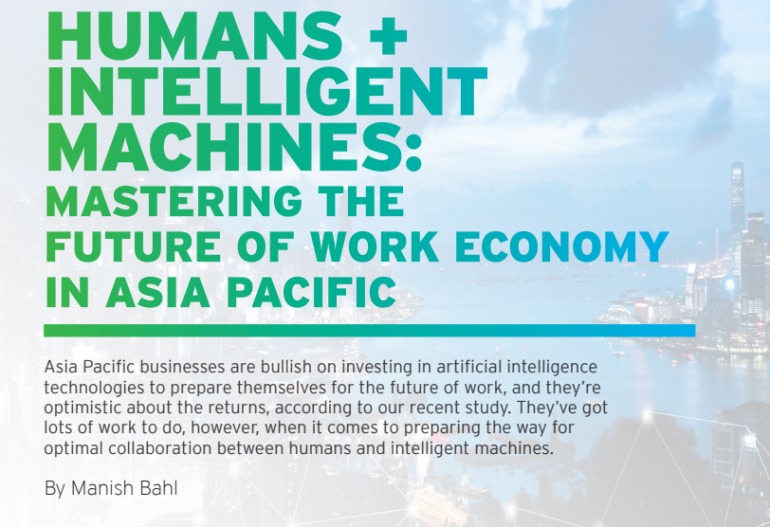Human work is undergoing a profound transformation, driven by the accelerating impact of Artificial Intelligence (AI), algorithms and automation entering into our daily work life. The Humans + Intelligent Machines report by Cognizant shares insight into the changes business leaders in Asia Pacific are making to take advantage of AI-driven technologies that augment human skills; the implications of intelligent machines for their companies; and how they can prepare to embrace these advancements to improve productivity, profitability and engagement.
Aggressive favourable government policies pertaining to AI, a freedom from legacy assets and an abundance of data are a few of the many reasons why businesses in Asia Pacific are particularly well positioned to benefit from the influx of AI into their operations, processes, workflows and business models. The report reveals that 82% of Asia Pacific businesses surveyed view intelligent machines as the number one influence on the future of work in the next five years, with businesses planning to spend 13.5% of their revenue on building and managing intelligent machines.
While businesses in Asia Pacific are bullish on investing in AI to prepare for the future of work and are optimistic about the returns, the road ahead to preparing the way for optimal collaboration between humans and intelligent machines remains long. The report reveals 35% of respondents are prepared to handle future work with machines, while 42% are confident about their ability to integrate intelligent machines with existing business processes.
Based on the findings, Cognizant has developed a framework to help traditional businesses systematically move toward the new world of work with intelligent machines. To get there, businesses must align five elements (5Ts) – teams, tasks, talent, technology and trust – to successfully transition into the new machine age.
- Teams: Small, Flexible and Hybrid
Human-machine teaming will change the way businesses manage their workforce, workflows, workspace and culture. In fact, 55% of businesses plan to integrate a human + intelligent machine team into their existing workforce strategy and planning, while 45% will develop a new workforce strategy in parallel with their existing strategy.
- Tasks: Learning to Assign and Share
No one task will be 100% driven by a machine or a human by themselves in the future; instead, every task will have some degree of shared involvement. Businesses will need to deconstruct jobs and identify which tasks are best performed by humans vs. intelligent machines. As cited by 58% of respondents, the overlapping capabilities of humans and intelligent machines across various tasks will help companies assign tasks between them.
- Talent: The Fusion of Human and Technical Skills
Talent scarcity will continue to be one of the biggest leadership challenges in implementing and evolving intelligent machines. Almost 70% of respondents said they struggle to find candidates with relevant skills. One way to address this problem is to focus more on fundamental attributes and behaviours than on skills, through role modelling, psychologist-led skills assessments, mentoring and a work environment that prioritises and rewards human skills.
- Technology: IT Matters More Than Ever
IT infrastructure needs to become agile, responsive, flexible, secure, scalable and simple to transition to AI-first world. Our data reveals that 76% of respondents expect IT to manage the roadmap for a technology infrastructure that integrates AI-driven technologies, while 68% said augmented reality/virtual reality (AR/VR) will be a driving force for enabling workers to collaborate meaningfully with machines through a simple and intuitive interface.
- Trust: The New Battle Ground for Success
Employer-employee trust and human-machine trust to undergo a radical change. While 58% of respondents cited fear of job loss as a significant challenge to the adoption of intelligent machines, 65% of them are concerned about the unknown consequences of intelligent machine failures. From unexpected or biased results, to perpetuation of dangerous errors, many people fear “what can go wrong” with intelligent machines. Business leaders can address the human-machine trust issue by providing adequate training on the use of AI systems and focus on self-regulation based on openness and accountability, with an obsession for maintaining consumer trust.
The complete Humans + Intelligent Machines report can be found here.
About Cognizant
Cognizant (Nasdaq: CTSH) is one of the world’s leading professional services companies, transforming clients’ business, operating and technology models for the digital era. Our unique industry-based, consultative approach helps clients envision, build and run more innovative and efficient businesses. Headquartered in the U.S., Cognizant is ranked 195 on the Fortune 500 and is consistently listed among the most admired companies in the world. Learn how Cognizant helps clients lead with digital at www.cognizant.com or follow us @Cognizant





